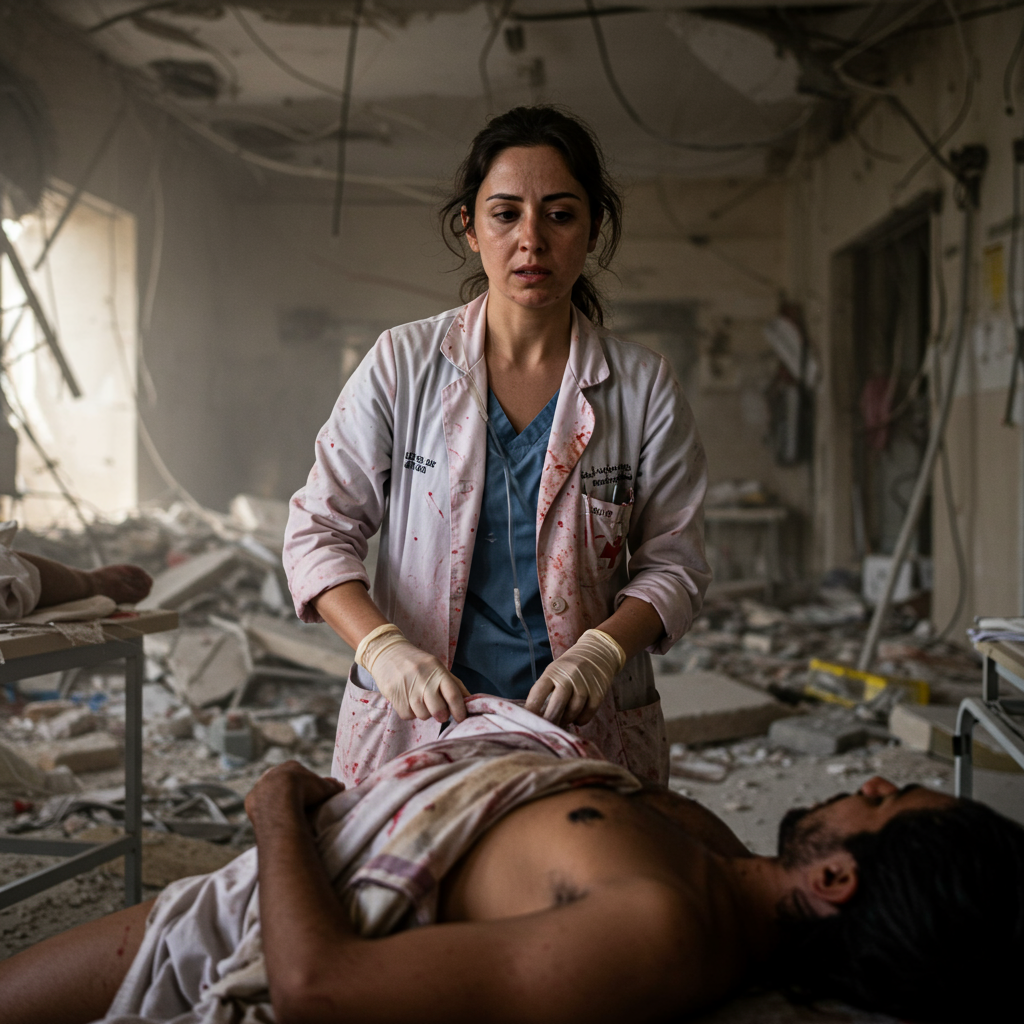Gaza is facing an unparalleled humanitarian catastrophe, with United Nations experts now describing the systematic destruction of its healthcare system as “medicide.” This grave accusation highlights a deliberate campaign against medical infrastructure and personnel, further intensifying an already dire crisis fueled by widespread starvation, mass displacement, and ongoing military operations. As international calls for intervention grow louder, the fundamental rights and very survival of Gaza’s population hang in the balance.
Gaza’s Healthcare System Under Siege: A Deliberate Destruction
The term “medicide” is being used by UN experts to characterize the calculated dismantling of Gaza’s healthcare facilities. According to Francesca Albanese, the Special Rapporteur on human rights in the Palestinian territory, and Tlaleng Mofokeng, the Special Rapporteur on the right to health, Israel is intentionally targeting and starving healthcare workers, paramedics, and hospitals to eradicate medical care. These actions are labeled as “war crimes committed before our eyes” and a “sinister component of the intentional creation of conditions calculated to destroy Palestinians in Gaza,” amounting to acts of genocide.
The reality on the ground is grim. Nastasha Davies, a nursing activities manager with Doctors Without Borders (MSF), describes Gaza’s healthcare sector as “utterly horrific.” She reports that not a single state hospital is fully functioning, and while some facilities offer limited services, they are overwhelmed and incapable of meeting the immense demand. Healthcare workers face constant threats, battling extreme heat and rising hunger, often going to work unsure if they will return to their families. The World Health Organization (WHO) chief, Tedros Adhanom Ghebreyesus, warns that over 14,800 patients require urgent medical treatment unavailable within the enclave, underscoring the critical need for external medical evacuations.
The Unfolding Catastrophe: Starvation as a Weapon
Beyond the direct assaults on medical facilities, Gaza’s population is facing a severe starvation crisis. The Government Media Office in Gaza reports that 235 people, including 106 children, have died from starvation as the humanitarian situation reaches “catastrophic levels.” Hospitals and health centers struggle under an Israeli blockade that severely restricts food and medicine for Gaza’s 2.4 million residents, over half of whom are children.
Alarming figures reveal the scale of food insecurity:
40,000 infants under one year old suffer from malnutrition.
250,000 children under five face life-threatening food shortages.
1.2 million children under 18 live in severe food insecurity.
These statistics underpin accusations that Israel is using starvation as a weapon of war, a direct violation of international humanitarian law. UN Relief and Works Agency for Palestine Refugees (UNRWA) head Philippe Lazzarini lamented these deaths as “the latest in the war on children and childhood in Gaza,” noting that over 40,000 children have been killed or injured, and one million deeply traumatized children are out of education. Recent incidents include at least 98 Palestinians killed in Israeli attacks, with 37 aid seekers among them. In one particularly tragic event, an Israeli strike in central Gaza killed at least 15 people, including eight children and two women, who were queuing for nutritional supplements outside a clinic.
Broader Implications: Genocide Allegations and Forced Displacement
The accusations of “medicide” are part of a broader concern raised by a UN Human Rights Council-commissioned report. This report alleges that Israel is committing “genocidal acts” through the systematic destruction of maternal and reproductive healthcare facilities across Gaza and the occupied West Bank. This includes the attack on Al-Basma IVF Centre in December 2023, which destroyed approximately 4,000 embryos, 1,000 sperm samples, and unfertilized eggs. The commission suggests this intentional attack on reproductive services constitutes a “prevention of births,” a category of genocidal act under international law.
The report also details an “deplorable increase” in sexual and gender-based violence, including forced public stripping, sexual harassment, and assault, which are alleged to be “part of the Israeli Security Forces’ standard operating procedures.” While Israel “categorically rejected the unfounded allegations,” denouncing the UN Human Rights Council as an “anti-Israel circus,” the report emphasizes that such systematic attacks were intentional.
Mass Displacement and Uninhabitable Conditions
The humanitarian crisis is compounded by the mass and forced displacement of Gaza’s civilian population. Human Rights Watch (HRW) reports that 1.9 million people—90% of Gaza’s 2.2 million residents—have been displaced since October 7, 2023. HRW asserts that Israel’s actions violate international humanitarian law, specifically Article 49 of the Fourth Geneva Convention, which prohibits forced displacement of civilians.
Key findings from HRW include:
Lack of Safety: Designated “safe zones” and evacuation routes have been repeatedly attacked.
Aid Restriction: A complete siege has cut off essential services, with Israel continuing to restrict or block humanitarian aid despite orders from the International Court of Justice (ICJ).
Preventing Return: Widespread destruction of over 60% of residential buildings and 93% of schools renders much of Gaza uninhabitable. The creation of permanent “buffer zones” and the “Netzarim Corridor” physically alter the landscape, appearing to prevent displaced Palestinians from returning.
These actions, HRW concludes, amount to forcible transfer (a war crime), forced displacement (a crime against humanity), and align with the definition of ethnic cleansing.
International Outcry and Demands for Urgent Action
The severity of the Gaza healthcare crisis and the broader humanitarian situation has triggered widespread international condemnation. Over 20 independent UN experts issued a dire warning, urging immediate action to prevent the “annihilation of the Palestinian population” and calling on the world to choose between remaining passive or working towards a just resolution. French President Emmanuel Macron described the humanitarian situation as “critical” and “unprecedented,” deeming Israel’s actions “unacceptable” for not adhering to international rules.
Volker Türk, the UN High Commissioner for Human Rights, warned of a “very dangerous moment” for civilians, predicting “only more destruction, more hatred, more dehumanisation” from an expanded offensive. He unequivocally demanded an immediate lifting of Israel’s blockade on Gaza, asserting it as an international legal obligation. Aid agencies have criticized Israel’s proposed plans to take over aid distribution, noting the military has previously prevented supplies from entering.
Global calls for action include:
Spain intends to present a draft resolution at the UN General Assembly for “urgent measures to stop the killing of innocent civilians and ensure humanitarian aid.”
The Netherlands called for an urgent review of the EU-Israel association agreement, describing Israel’s aid blockade as “catastrophic, truly dismal” and a clear breach of international humanitarian law.
Amnesty International demanded that Israel abandon plans for expanded military operations, warning of grave violations and potential “destruction of Palestinians in Gaza” amidst an “ongoing genocide.”
Greece expressed support for an Arab plan for Gaza’s post-ceasefire reconstruction.
Amidst these pleas, indirect ceasefire talks continue in Doha, though significant gaps remain between Israel and Hamas. Israeli Prime Minister Benjamin Netanyahu has stated that Israel’s conditions for a permanent end to the war involve Hamas disarming and Gaza being demilitarized. Meanwhile, the EU has announced a deal with Israel to open more aid crossings, repair infrastructure, and protect aid workers, though the UN warns that delivered fuel is far below daily demand.
Frequently Asked Questions
What is “medicide” and why are UN experts using this term for Gaza?
“Medicide” refers to the deliberate destruction of a healthcare system, including its infrastructure and personnel, to eradicate medical care for a population. UN experts, including Special Rapporteurs on human rights and health, are using this term for Gaza to describe what they allege is Israel’s intentional targeting of hospitals, clinics, and healthcare workers. They view this as a component of broader actions calculated to destroy Palestinians in Gaza, raising concerns about war crimes and acts of genocide.
How has the destruction of healthcare in Gaza impacted civilian lives, particularly women and children?
The destruction of Gaza’s healthcare system has dire consequences for civilians. Hospitals are largely non-functional, leading to a lack of essential medical treatment for thousands, including over 14,800 patients requiring specialized care unavailable locally. For women and children, this crisis is compounded by accusations of systematic destruction of maternal and reproductive healthcare facilities, impacting reproductive capacity and causing deaths from childbirth complications. Children are disproportionately affected by malnutrition, with thousands of infants and young children facing life-threatening food shortages, leading to a rising death toll from starvation.
What are international bodies demanding to alleviate the humanitarian crisis in Gaza?
International bodies, including the UN, human rights organizations, and various governments, are demanding several urgent actions. These include the immediate lifting of Israel’s blockade on Gaza to ensure unrestricted humanitarian aid flows, a cessation of hostilities, protection for civilians and aid workers, and adherence to international humanitarian law. There are strong calls for accountability for alleged war crimes and crimes against humanity, and for the safe return of displaced populations. Some nations are also advocating for a review of international agreements and the recognition of a Palestinian state to facilitate a just and sustainable peace.
Conclusion
The situation in Gaza has reached a critical juncture, characterized by the systemic dismantling of its healthcare system, exacerbated by widespread starvation and mass displacement. The UN’s stark warning of “medicide” underscores the profound human cost of the conflict and the alleged deliberate targeting of life-sustaining services. As international bodies continue to highlight violations of international law and advocate for urgent aid and protection, the need for a comprehensive and lasting resolution to the Gaza healthcare crisis and the broader humanitarian catastrophe becomes ever more pressing. The global community faces a moral imperative to act decisively to prevent further suffering and ensure dignity and basic rights for the people of Gaza.
Word Count Check: 1198 words




